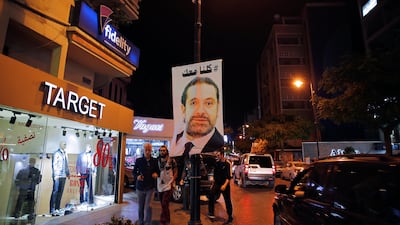November 2, two days before the Lebanese prime minister Saad Hariri resigned unexpectedly while on a seemingly routine visit to Riyadh, his economy minister Raed Khoury announced the government was trying to work out a policy that would reverse what he called Lebanon’s “gloomy economic situation”.
All that seems a long time ago and, dare I say, we would do anything to be back in that particular “gloom” right now.
The streets of downtown Beirut are empty. The city has that familiar smell of desperation. The Lebanese are aware that they are once again in crisis, one that not only threatens to destabilise the country but also smash what was left of a vulnerable economy.
Already, we are experiencing the fallout: yesterday it was announced that the Four Seasons and Movenpick hotels, both of which belonged to the Saudi billionaire Prince Alwaleed bin Talal, are up for sale and are said to be on the market at well below what they are worth. The prince clearly has his own problems but the symbolism of a serious Saudi investor “leaving” Lebanon in a hurry cannot be ignored.
And we only have ourselves to blame. Whether or not it was overt pressure from Saudi Arabia that forced Mr Hariri to step down, the fact remains that the kingdom doesn’t keep an army in Lebanon. Iran does, and has done for over a quarter of a century and it is precisely Hizbollah’s presence in Lebanon that has thwarted the country’s economic growth and once again threatens to do so.
Yes, the Lebanese are outraged that their prime minister was forced to give up the premiership on foreign soil amid a crackdown when senior Saudis were arrested on corruption charges but, if we are being completely honest, this crisis hasn’t just happened. It has its roots in the establishment of Hizbollah as the “official” resistance to Israel’s 18-year occupation of South Lebanon from 1982 to 2000.
When the area was liberated, instead of putting down their weapons, Hizbollah dug in, claiming to be the guarantors against future aggression, all the while consolidating its own internal power base.
Understandably, the economy and economic confidence has always suffered, but Hizbollah has ensured that its constituents are insulated from the buffeting effects of its actions by providing social services and utilities.
The upshot is that today Lebanon is part of an Iranian crescent taking in Baghdad, Damascus and Beirut. Yes, Lebanon’s power sharing system ensures mixed participation, but on closer inspection it is clear that the president Michel Aoun owes his job to Hizbollah and it is also clear that Saudi Arabia ran out of patience with Hizbollah’s ever-tightening grip on the country.
Hypocrisy? Maybe. But the difference is that Saudi Arabia was always a pillar of Lebanon’s stability, advocating economic growth rather than conflict as the overarching priority. The country sent Saudis to spend and it happily employed Lebanese, who thrived in middle management positions and who sent home US$2bn.
_____________
Read more:
Lebanon must not get caught in the crossfire between Hizbollah and its critics
Former US diplomat: Hariri resignation a threat to Lebanon’s 'delicate balance'
With Hariri gone, Lebanon is on a dangerous path
_____________
Now we risk pariah status and all that goes with it, including an unofficial boycott of Lebanese human capital and a gradual reduction in the 300,000 Lebanese who are employed in the GCC. Furthermore, given America’s support of the kingdom, some Lebanese-Americans may be increasingly vulnerable to surveillance by the US Foreign Account Tax Compliance Act, given the possibility of ties with Hizbollah.
Things had been going relatively well for Lebanon. The government had been relatively functional. The oil and gas files were dusted down and tenders prepared and there was even a move to spend on infrastructure. Now it’s all on hold.
The good news is that the Lebanese pound is still solid. The central bank has ample foreign currency reserves and has proven ability to get liquidity.
The current system can prevent the country from defaulting on its debt – but it fails in everything else.
Ultimately Lebanon’s problems run deeper than a prime ministerial resignation. For nearly 30 years, we have been waiting for radical economic and social reform and an economy run by competent and transparent technocrats. Privatisation is also needed, as is deep sector restructuring, while a debt repayment plan must not only be established but also announced as public policy.
In the meantime, whatever aspirations we might have to be economically stable and prosperous, it’s all about taming Hizbollah, a party that has driven a wedge into the country. And the truth is that Hizbollah’s supporters deserve better. They have stood by the party – but one wonders just how long this loyalty can last if economic opportunities are curtailed and constituents become stigmatised by the party’s activities.
Surely the party must now recognise that it has reached a crossroads in its history and that it cannot expect to throw its weight around in Lebanon, the region, and the rest of the word, with impunity and without repercussions.
Michael Karam is a freelance writer who lives between Beirut and Brighton

